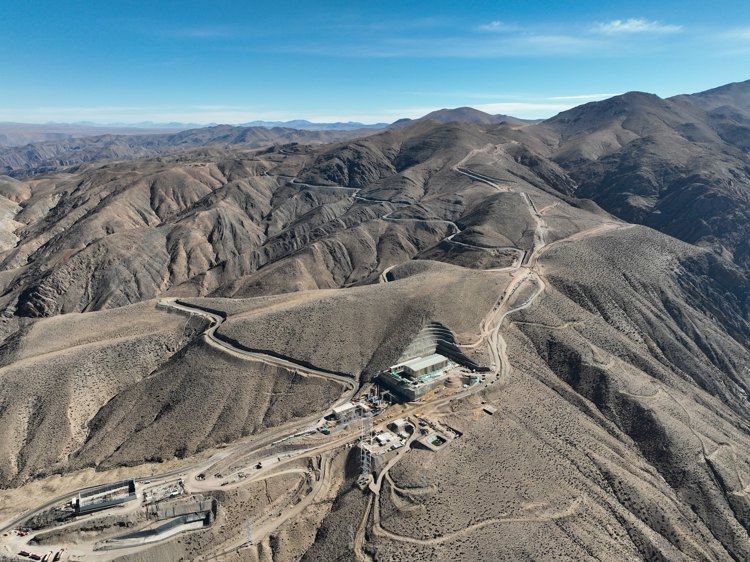
Techint E&C is developing water pumping systems and desalination plants to support the needs of Chile’s mining sector. The C20+ project, one of its largest undertakings in the country, shows how infrastructure can deliver practical solutions for a more sustainable mining industry.
Chile is one of the countries facing severe water stress, a challenge that affects both local communities and one of its key economic pillars: the mining industry. In response, Techint Engineering & Construction is designing comprehensive and innovative solutions to tackle this issue from the earliest stages.
One of these initiatives is a seawater pumping system launched in 2022, designed to extend the life of the Compañía Minera Doña Inés de Collahuasi (CMDIC) mine by 20 years (C20+). The project will transport desalinated water from the Pacific coast to the mine at an altitude of 4,400 meters, through a 194-kilometer network of pipelines and five pumping stations, with an initial flow capacity of 1,100 liters per second.
“The project is 98% complete, so we're moving into startup phase now,” explains Ricardo Juan, Project Manager at C20+. “We're already moving water between stations, which means that it's just a matter of reaching the mine, which will be the big milestone we've all been waiting for.”
“This isn’t our first seawater pumping system. We've been working on similar projects since 2005, starting with Los Pelambres, and later with Esperanza, Quebrada Blanca, and Sierra Gorda,” he adds. Nearly two decades of experience paved the way for the company to tackle a project of this scale.
At the same time, the company is finalizing the Desalinated Water Supply for the Northern District (SADDN) project for Aguas Horizonte. The initiative includes a desalination plant, a 160-kilometer aqueduct, and a network of pumping stations to serve a growing number of mining operations in northern Chile.
This momentum is backed by key recent achievements. Techint E&C has just completed the pumping system for the Interconexión project in record time, linking the Quebrada Blanca mine with facilities in Collahuasi. And it’s already begun delivering water to the operation, in tandem with advances for the C20+ startup.
According to the Chilean Copper Commission (Cochilco), by 2032, seawater is expected to supply 68% of the water used in copper mining, gradually replacing continental sources.
This shift is even more relevant in light of global trends: copper demand is projected to increase by 60% by 2050, driven by the expansion of renewable energy sources, the growth of electric vehicles, and rapid urbanization across Asia.
Latin America leads the world in copper production, with Chile and Peru at the forefront. “In this context, Argentina has enormous potential,” says Juan. “It’s sitting on major copper deposits and reserves, but the real test lies in building the infrastructure to get water up to the Andes—possibly from Chile—and figuring out how to get that copper out to the ports as efficiently as possible,” he adds.

C20+ stands out not only for its technical scale and impact on water sustainability in mining, but also as a powerful example of how digitalization can enhance traceability, operational efficiency, and quality management in large-scale projects.
“From day one, we set out to digitize processes in a serious, meaningful way, not just using this as a buzzword,” explains Juan. “That meant rethinking long-standing practices and adopting tools that could help us manage more quickly, seamlessly, and reliably."
One major achievement was the implementation of Pipetrak IT, a pipeline data management software tailored to the project’s needs to consolidate all quality and traceability data into a single, centralized platform.
Other pre-existing systems were also upgraded, including HMS Web, a key tool for pre-commissioning, which has acquired new features for quality control and construction progress tracking. Meanwhile, HR Mobile was enhanced to digitize a wide range of processes, such as personnel transport management. “We didn’t invent anything new, but we certainly made a leap forward in quality,” Juan reflects. “Now we have reliable, traceable, and centralized information—something we didn’t have before.”
C20+ and SADDN are the largest projects that Techint E&C has ever undertaken in Chile, where the company has been operating for over 70 years. Today, its expertise in pipeline construction is driving the development of comprehensive solutions to secure water supply for mining, with a focus on desalination and sustainability. It’s a long-term commitment to water efficiency that is set to shape the future of industry in Chile and beyond.